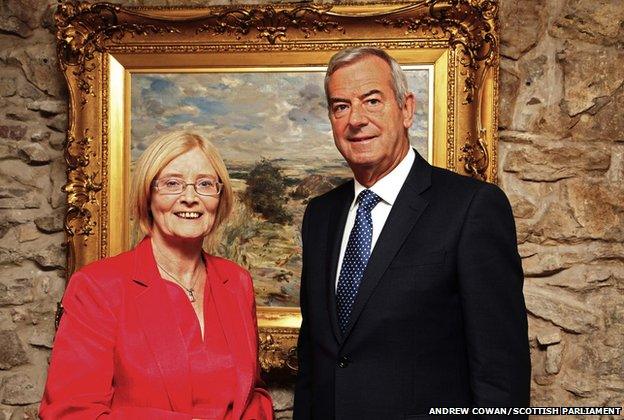Agreement on new powers for Scotland 'not easy', says Lord Smith
- Published
Lord Smith met Scottish Parliament Presiding Officer Tricia Marwick as he arrived to begin talks with the political parties
The head of the new commission on delivering more powers to Scotland has warned it will "not be easy" to get agreement from political parties.
Lord Smith said those involved in the talks would require "courage" and "compromise" - but he was confident they would rise to the challenge.
The discussions on new powers for Holyrood are taking place after Scotland voted against independence.
Draft legislation is due to be unveiled by the end of January.
In the wake of last Thursday's referendum "No" vote, the leaders of the main UK parties said they were committed to devolving new powers - expected to include tax, spending and welfare - from Westminster to Scotland.
Scottish ministers have warned against any delay in the process.
Lord Smith, whose appointment was announced by Prime Minister David Cameron in the wake of the referendum "No" vote, said: "We have a willingness, shared by all five of Scotland's main political parties, to strengthen the powers of the Scottish Parliament.
"My message today to the political parties is a simple one - Scotland expects you to now come together, work together and agree the detail of what those powers should be."

Lord Smith met Scottish Parliament Presiding Officer Tricia Marwick, as he arrived to begin talks with the political parties
Speaking from the Scottish Parliament, Lord Smith added: "Time is tight but this is not an exercise in thinking about what we could do; that has been done. It is about agreeing on what we will do.
"My job is to create a process through which agreement is reached, but I cannot force an agreement.
"It will not be easy; it will require positive intent, courage and compromise from all parties. But I have confidence that our political leaders will rise to the challenge and I look forward to working with them."
Lord Smith added that Scottish civic organisations and the wider public would get a say on the issue of more powers for the Scottish Parliament.
He also announced initial details of the remit for the commission.
The Smith Commission aims to get agreement between the SNP, Scottish Labour, the Scottish Liberal Democrats, Scottish Conservatives and Scottish Greens on the way forward by 30 November.
A "command paper", setting out the issues, is also due to be published by 31 October, with draft legislation unveiled by 25 January.
Lord Smith has asked each Scottish party to nominate two representatives to take part in the cross-party talks
The referendum saw Scotland voting to stay in the United Kingdom by 2,001,926 votes to 1,617,989 - about 55% to 45%.